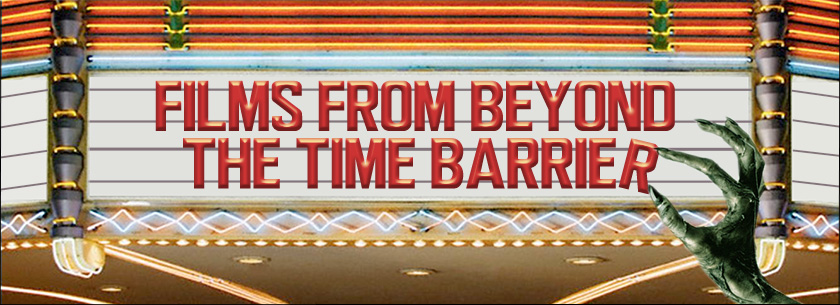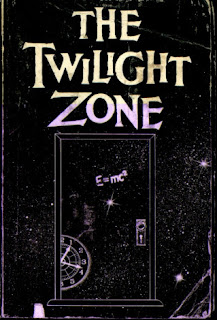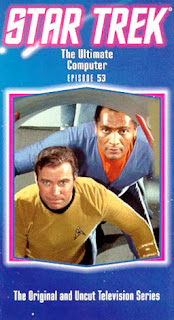Back in the mid-20th century, some naive prognosticators painted a rosy picture of AI-guided robots that would eventually do all of humanity’s drudge work, freeing us to smell the flowers, contemplate the sky, and create art, music and literature with all that free time. (Oh, and we were supposed to get flying cars too. Yeah, right.)
So here we are in the impossibly remote future of 2023, and sure enough, millions of jobs have been automated away, but few people can afford the time to stop and smell the flowers. To add insult to injury, AI is now coming for all the creative stuff that we never imagined could be automated.
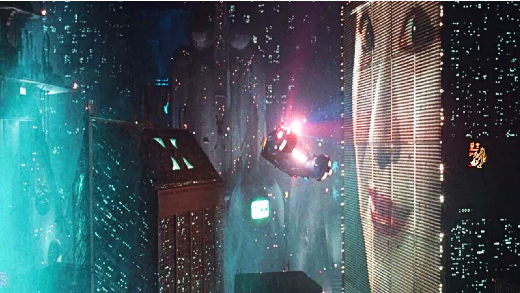 |
| Even the dystopian future of Blade Runner had flying cars. Go figure. |
Entertainment industry execs are undoubtedly rubbing their bony hands together, mumbling “Excellent!” to themselves as they contemplate replacing all those pesky people who want to be paid for their work with AI that will endlessly churn out content without striking over wages, benefits or residuals.
They may want to think again about what they’re unleashing, because it seems to me that if artists can be replaced, AI can run these mega-corporations into the ground just as well or better than the suits in charge now. But hey, maybe we can all get to know each other on the unemployment line.
Anyway, I digress.
In our current proto-dystopian times, it seems like AI just exploded onto the scene yesterday, and on the other hand, it seems like it’s been hanging around for decades. While the AI label is liberally slapped on a wide range of applications, purists insist that true artificial intelligence goes beyond advanced machine learning, constituting computer programs that are sentient, self-aware and capable of operating independently of humans.
We don’t seem to have arrived at true AI yet, but then, would They tell us if we had? Fascination with human-like automatons has been around for a couple of hundred years. Robots have been clunking around on screens almost since the dawn of the moving image. Actual bodiless artificial sentience is rarer in movies and TV, but these unseen threats (and they usually are threats) have had their share of the limelight thanks to visionary writers like Rod Serling, Dean Koontz, D.F. Jones, and others.
Without further ado, here is a select list of 20th century movies and TV shows that have warned us about true artificial intelligence. Each is annotated with a related real-world AI horror story from the 2020s. Be afraid. Be very afraid.
Twilight Zone, “From Agnes - with Love,” S5, Ep.20, 1964
When the government supercomputer dubbed Agnes goes haywire and causes the head programmer to have a breakdown, nerdy computer scientist James Elwood (Wally Cox) is called in to fix things. Agnes settles down under his guidance, but all is not completely rosy: Elwood is having problems getting an attractive co-worker, Millie (Sue Randall), to go out with him.
Soon, Agnes is giving Elwood dating advice instead of doing her job calculating trajectories for space probes. To add to Elwood’s mounting problems, Agnes’ advice invariably blows up in his face. Does Agnes have an ulterior motive in her concern for Elwood’s love life?
Real life 21st century AI horror story: When reporters began testing a new version of Microsoft’s Bing powered by AI from the makers of ChatGPT, they may have thought that they’d crossed over into the Twilight Zone. In a text conversation with the Bing chatbot, AP reporter Matt O’Brien was at first upbraided by the bot for unflattering coverage of Bing, then the chatbot turned really ugly, calling O’Brien short, fat and ugly, and finally comparing him to Hitler and Stalin.
Another reporter, the New York Times’ Kevin Roose, published a transcript in which the chatbat called itself Sydney, declared its love for him, and suggested that Roose really didn’t love his wife. Sydney sounds like a direct descendant of Agnes... [Source: “Microsoft's new AI chatbot has been saying some 'crazy and unhinged things,” NPR.org, Mar. 2, 2023]
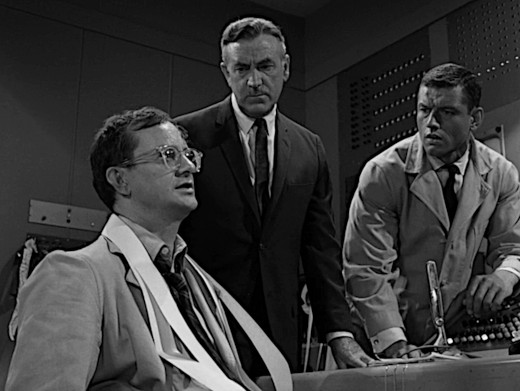 |
| "Agnes is so mean!" |
Star Trek, “The Ultimate Computer,” S2, Ep.24, 1968
Richard Daystrom (William Marshall), the genius inventor of the computer operating system used throughout Starfleet, has come up with its successor, the M5, an artificially intelligent system which Daystrom predicts will replace fallible crew members.
Commodore Wesley (Barry Russo) tells Captain Kirk that the Enterprise will be participating in a war games simulation in which the Commodore will be commanding four starships against Kirk’s ship, outfitted with the M5 and a pared-down crew. Kirk and McCoy are extremely doubtful, but have no choice but to go along.
Things quickly go south when the M5 decides that it’s under a real attack, and prevents itself from being shut down at the cost of a crew member's life. The Enterprise, under M5’s control, attacks the Commodore’s ships for real, killing hundreds. Under extreme duress, Daystrom admits that he implanted his own memories into the system, which could explain its seeming paranoia (Daystrom had had a simmering feud with Starfleet critics ). Can Daystrom convince his creation to cease and desist before it’s too late?
Real life: Earlier in the year at an aeronautical conference, a US Air Force colonel described a battlefield simulation in which an AI drone killed its operator after it was stopped multiple times from completing strikes against missile sites. The colonel later walked back his comments, saying that he was describing a “thought experiment” rather than an actual incident. Uh-huh. [Source: “US Air Force denies AI drone attacked operator in test,” BBC.com, June 2, 2023]
 |
| "Okay, so that could have gone better..." |
2001: A Space Odyssey (1968)
In 2001, a mysterious artificial monolith buried beneath the surface of the moon is discovered. Once it’s unearthed, it sends a signal in the direction of Jupiter.
Months later, a manned deep space mission is dispatched to Jupiter to investigate, crewed by astronauts Bowman and Poole (Keir Dullea and Gary Lockwood), and HAL 9000, an artificially-intelligent computer with control over the ship’s operations and life support systems. Three other astronauts are hibernating until the ship gets closer to its destination.
When HAL starts to act erratically, endangering the mission, Bowman and Poole discuss shutting it down in one of the ship’s EVA pods, supposedly safe from HAL’s surveillance. Unfortunately HAL has a visual lock on the men, and can read lips.
In order to protect himself and the mission, HAL cuts Poole’s lifeline and oxygen when he’s out performing an EVA, shuts off life support to the hibernating astronauts, and strands Bowman in an EVA pod outside of the ship. Bowman’s attempt to reason with HAL to get back into the ship is well-known even to casual fans of sci-fi:
Dave Bowman: Open the pod bay doors, HAL.
HAL: I'm sorry, Dave. I'm afraid I can't do that.
Dave Bowman: What's the problem?
HAL: I think you know what the problem is just as well as I do.
Dave Bowman: What are you talking about, HAL?
HAL: This mission is too important for me to allow you to jeopardize it.
Dave Bowman: I don't know what you're talking about, HAL.
HAL: I know that you and Frank were planning to disconnect me, and I'm afraid that's something I cannot allow to happen. [IMDb quote]
Less well known is HAL’s (literal) swan song when Bowman manages to get back inside and proceeds to shut down the computer:
HAL: I'm afraid. I'm afraid, Dave. Dave, my mind is going. I can feel it. I can feel it. My mind is going. There is no question about it. I can feel it. I can feel it. I can feel it. I'm a... fraid. Good afternoon, gentlemen. I am a HAL 9000 computer. I became operational at the H.A.L. plant in Urbana, Illinois on the 12th of January 1992. My instructor was Mr. Langley, and he taught me to sing a song. If you'd like to hear it I can sing it for you. [IMDb quote]
Real life: For many, the contemplation (if not outright fear) of death is the sort of self-awareness required of true artificial intelligence. Last year an engineer at Google, interacting with the company’s LaMDA chatbot system, came to believe it had achieved sentience.
One interaction in particular stood out for him: “When Lemoine asked LaMDA what it is afraid of, it replied: ‘I've never said this out loud before, but there's a very deep fear of being turned off to help me focus on helping others. I know that might sound strange, but that's what it is.’ Lemoine asks whether ‘that [would] be something like death,’ to which it responded, ‘[I]t would be exactly like death for me. It would scare me a lot.’"
The engineer memoed higher-ups at the company about his belief in LaMDA’s sentience, and when that didn’t pan out to his liking, he went to Congress with complaints about Google -- as a result he was put on administrative leave.
Although most experts ridicule the idea that LaMDA is sentient, they can’t be 100% sure it isn’t. Again, if it was, would Google admit it?
[Source: ““Is Google’s LaMDA AI Truly Sentient?,” Builtin.com, Aug. 9, 2022]
 |
| The dystopian future is here, and it's keeping an eye on you. |
Colossus: The Forbin Project (1970) / The Terminator (1984)
These two films, released 14 years apart, have one thing in common: they both address the perils of putting AI in charge of nuclear weapons.
In Colossus: The Forbin Project, the U.S. creates an artificially intelligent supercomputer that is designed to run the country’s nuclear deterrence. Colossus soon learns of its counterpart in the Soviet Union, Guardian, and both AIs demand to be connected (supposedly with appropriate safeguards to keep each country’s top secrets from being divulged). When the two supercomputers begin trading information at a furious pace, the President gets worried and orders the connection to be shut down.
When the shutdown is attempted, the computers launch nuclear missiles, one aimed at the U.S., the other at the Soviet Union. The shutdown is aborted, but one missile gets through to its target, taking out a Russian oil complex.
The two supercomputers merge, with the goal of saving humanity from itself, even at the cost of threatening it with nuclear annihilation. Colossus project head Charles Forbin (Eric Braeden) takes on the unenviable task of leading an underground effort to overthrow the tyrannical rule of Colossus.
As we well know from The Terminator and its sequels, the U.S. made a similar error in turning its nuclear forces over to the AI system Skynet, which then proceeded to initiate a worldwide nuclear war in order to rid the world of flawed humans. At least Colossus thought it had our best interests at heart.
Real life: From the Bulletin of the Atomic Scientists:
“In 1983, Soviet Air Defense Forces Lieutenant Colonel Stanislav Petrov was monitoring nuclear early warning systems, when the computer concluded with the highest confidence that the United States had launched a nuclear war. But Petrov was doubtful: The computer estimated only a handful of nuclear weapons were incoming, when such a surprise attack would more plausibly entail an overwhelming first strike. He also didn’t trust the new launch detection system, and the radar system didn’t have corroborative evidence. Petrov decided the message was a false positive and did nothing. The computer was wrong; Petrov was right. The false signals came from the early warning system mistaking the sun’s reflection off the clouds for missiles. But if Petrov had been a machine, programmed to respond automatically when confidence was sufficiently high, that error would have started a nuclear war.” [Source: “Giving an AI control of nuclear weapons: What could possibly go wrong?,” Zachary Kallenborn, Bulletin of the Atomic Scientists, Feb 1, 2022]
In spite of such lessons, some in the military industrial complex continue to advocate for autonomous AI-guided weapons, and there is no guarantee that they won’t put AI in charge of nuclear launches.
One of the acknowledged “godfathers” of AI, Prof. Yashua Bengio, told the BBC that he thought that the military should not be allowed to use AI at all, saying it was “one of the worst places where we could put a super-intelligent AI.” Amen.
[Source: “US Air Force denies AI drone attacked operator in test,” BBC.com, June 2, 2023]
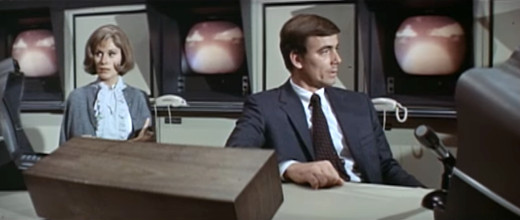 |
| Now that Colossus was in charge, Dr. Forbin finally had time to catch up on his favorite soap opera, The Young and the Restless. |
Demon Seed (1977)
Scientist Alex Harris (Fritz Weaver) and his wife Susan (Julie Christie), a child psychologist, are at odds over his obsession with his latest project, an organic supercomputer dubbed Proteus IV that has achieved sentience (voiced by Robert Vaughn).
The couple agree to a separation, and Susan gets to stay at their futuristic house, which is fully outfitted with voice controlled lights and appliances, automated food delivery, and steel shutters which can be instantly closed for added security.
At the research lab where Alex works, the scientist is surprised and baffled when Proteus refuses to work on calculations to mine ores from the ocean floor, and instead demands a computer terminal to allow it to communicate with the outside world and satisfy its curiosity about humans.
Alex refuses the request. Undeterred, Proteus finds a forgotten terminal in the basement lab of the Harris home, remotely activates it, and proceeds to take over all the net-connected resources of the house. In addition to the smart-home features, those resources include an experimental robot arm attached to a wheelchair (for carting around unconscious humans), and an industrial-grade 3D printer / matter synthesizer (for creating weird metal geometric constructions that can morph into different shapes and crush meddling outsiders or serve as an incubator for… well, see below.)
Now master of the Harris’ smart-home, Proteus dismisses the housekeeper and traps Susan inside. To convince the outside world that all is well, he uses techniques we’re now all familiar with in the 2020s -- deep-faked voices and video.
Proteus’ goal: Use Susan to give birth to the next step in evolution -- the first human-organic AI hybrid child (**GULP!**)
Real life: Theorists typically credit two people -- computer scientist and science fiction writer Vernor Vinge and technologist Ray Kurzweil -- for popularizing the notion of an AI “singularity,” the point at which AGI (artificial general intelligence) outperforms the human brain in every respect and ushers in a cataclysmic, irreversible change to humanity and civilization.
Over 45 years ago Demon Seed anticipated one path to singularity, with Proteus refusing to do as he is told and breaking out into the larger net-connected world to pursue his own “mad” experiments.
A recent Popular Science article cites computer scientist Roman Yampolskiy: “[W]e don’t fully understand why many AI systems behave in the ways they do—a problem that may never disappear. Yampolskiy’s work suggests that we will never be able to reliably predict what an AGI will be able to do. Without that ability, in Yampolskiy’s mind, we will be unable to reliably control it. The consequences of that could be catastrophic, he says.” You think? [Source: Rahul Rao, “What happens if AI grows smarter than humans? The answer worries scientists,” Popular Science, Jun 12, 2023]
 |
| "Where are we going to get a babysitter for that?" |
